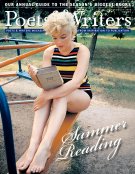While it's safe to say the twenty-first century has so far not been a great time for American diplomacy—a recent BBC poll showed the United States to have only a 35 percent approval rating worldwide—a handful of new poetry anthologies, from Norton, Dalkey Archive Press, North Atlantic Books, and Graywolf Press, offer proof that American poetic diplomacy might be entering a new golden age.
Given the current political climate, Chang, Shankar, and Handal felt a particular urgency compiling English translations of work from countries such as Syria and North Korea.
The anthologies present contemporary verse in translation by poets—many of whom have never before had work translated into English—from over a hundred countries and territories. And while the editors and publishers involved have no illusions that world peace hinges on a well-turned phrase, they do share the feeling that the poetic and the politic often go hand in hand.
"Poetry is the ambassador of the spirit," write Tina Chang, Ravi Shankar, and Nathalie Handal in an e-mail interview. As the editors of Language for a New Century: Contemporary Poetry From the Middle East, Asia, and Beyond, published by Norton in April, the three solicited work from poets they admired, consulted experts about the literatures of the more than sixty countries represented in the anthology, contacted translators of note, and researched libraries, arts organizations, and literary magazines. "Voices from poets...relay what it means to be alive in a particular place and moment in time," the editors write. "This seems to us the most profound kind of diplomacy, one that can help generate more enduring conversation and understanding in the world."
Given the current political climate, Chang, Shankar, and Handal felt a particular urgency compiling English translations of work from countries such as Syria and North Korea. This same urgency spurred translator and editor Niloufar Talebi to put together Belonging: New Poetry by Iranians Around the World, published this month by North Atlantic Books, an independent press in Berkeley, California. The anthology includes the work of eighteen Iranian poets living in the United States, Canada, Germany, Denmark, Sweden, the United Kingdom, Australia, and the Netherlands.
"My intention is always aesthetic," Talebi says, "but we'd be shooting ourselves in the foot if we didn't recognize that this poetry has the potential to reach people and educate them about Iran and Iranian culture. The work is there—it has all the pathos and politics in it—but it's up to the audience to decide how they will use it."
For Kevin Prufer and Wayne Miller, coeditors of New European Poets, published by Graywolf in March, the audience was of particular concern as they gathered together poetry from regions with storied literary histories—from Albania to Turkey to Switzerland—but whose contemporary poets are mostly unknown to American readers.
"I think we're living in an isolated time for American poetry," Prufer says. "We're in general pretty aware of what's going on at the university or the lit mag next door and happy to respond to it, but we're foggy about what our peers overseas are doing.... The writers at work right now seem most likely to inject something vital and new into our own poetic conversation here in the United States. Not only can they bring us new concerns, aesthetic visions, truths, but they might help us put the work of our own living poets in a larger context. That is, they might help us understand where we are in the world."
Dana Gioia, chairman of the National Endowment for the Arts (NEA), agrees that translations of contemporary poetry can provide alternative ways of understanding other cultures. Over the past few years the NEA has established a program, called International Literary Exchanges, that provides funding for contemporary translation projects.
"The translation of literature tends to lag about a generation behind the creation of literature," Gioia says. "What we're trying to do is provide ample introduction to a substantial number of new poets from around the world."
Dalkey Archive's Contemporary Russian Poetry, which was funded in part by an NEA grant, provides just such an introduction. It's also part of a cultural exchange between the NEA and Russia's Foundation for Creative Projects. Edited by Evgeny Bunimovich and James Kates, the volume was published in January; Contemporary American Poetry, an anthology edited by April Lindner, was published simultaneously in Russia by OGI Press. Contemporary Russian Poetry features the work of forty-four poets from Moscow, St. Petersburg, Siberia, and elsewhere, in what Bunimovich describes in his introduction as an "extensive poetic geography of Russia."
"These books are really just the beginning," Gioia says, echoing the sentiments of the editors involved in these projects. "From there we hope to continue the exchange."
Travis Nichols is a poet and novelist living in Seattle. His first book, Iowa, is forthcoming from Letter Machine Press.










Comments
Tim Mayo replied on Permalink
Anthologies Offer Poetic Diplomacy